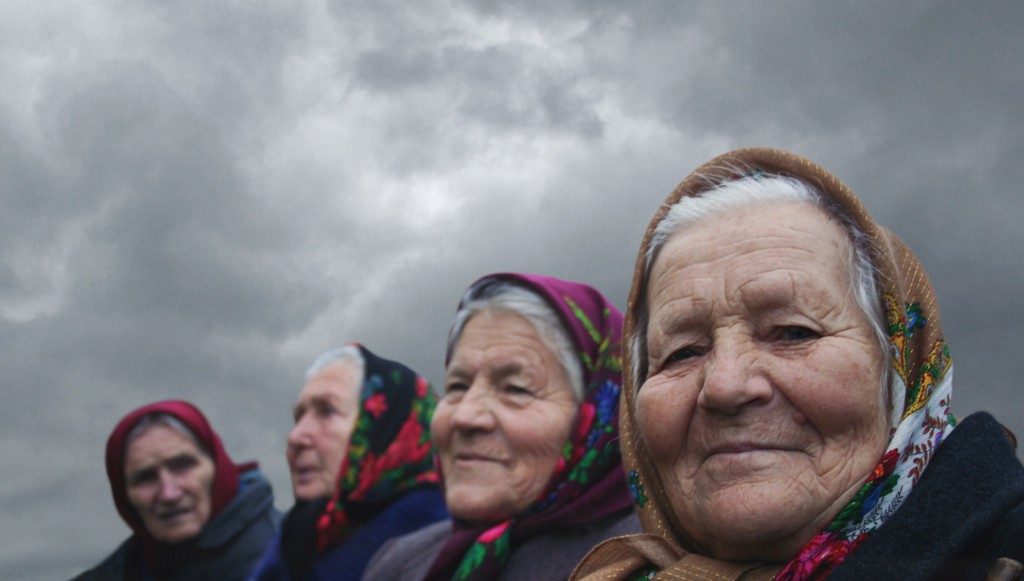Holly Morris has written and directed several documentaries that
explore the lives of courageous women: politicos, activists and artists
making change in their home cultures. “The Babushkas of Chernobyl” is based on her award-winning and widely
syndicated essay of the same name (also published as “Ukraine: A
Country of Women”) and her popular TED Talk. She’s the author of
“Adventure Divas: Searching the Globe for a New Kind of Heroine.” (Press materials)
“The Babushkas of Chernobyl” will premiere at the 2015 DOC NYC Film Festival on November 18. The documentary is co-directed by Anne Bogart.
W&H: Please give us your description of the film playing.
HM:
In the radioactive Dead Zone surrounding Chernobyl’s Reactor №4, a
defiant community of women scratches out an existence on some of the
most toxic land on Earth. They share this hauntingly beautiful but
lethal landscape with an assortment of visitors — scientists, soldiers, even stalkers — young thrill-seekers who sneak in to pursue
post-apocalyptic video game-inspired fantasies. Why the women chose to
return after the disaster — defying the authorities and endangering
their health — is a remarkable tale about the pull of home, the healing
power of shaping one’s destiny and the subjective nature of risk.
W&H: What drew you to this story?
HM:
The women themselves, who are remarkable, self-determined survivors
with fierce ties to their motherland and a firm belief in the palliative
powers of home — and humor. They survived Stalin’s famines and Nazi
atrocities, so when Chernobyl happened a few decades into Soviet
rule, they were not going to flee in the face of an enemy that was
invisible. Radiation or not, they are now at the end of their lives.
I was first there covering the 25th anniversary of the accident
for the PBS series “Globe Trekker” (2010) and stumbled across the
crazy reality that people were living inside the Exclusion Zone and had
been for nearly 30 years. I went back a month later and did an
investigative print piece (syndicated in MORE, the Independent,
Telegraph, CNN, etc.), then began shooting in 2012. I’m still fascinated
and inspired by these extraordinary lives that are a whisper away from
over.
W&H: What was the biggest challenge in making the film?
HM:
You’d think it was the radiation, and certainly that created
production challenges. But in fact the hardest part was crafting the
story — creating arc and tension in post-production. The characters are
amazing, and the Zone itself fascinating, but not a lot happens in the
mostly abandoned 1000-square mile Dead Zone. Also, when the villain of
your story is invisible, that’s tricky!
W&H: What do you want people to think about when they are leaving the theater?
HM:
They’ll be astonished at the power, humor, resilience and
self-determination of the women of the Zone. They’ll be thinking about home and community, and they’ll be reflecting on the complex, nuanced
realities of this singular place, where suffering, happiness and humor
all live together in a radioactive wasteland. They will also be
wondering how they can get their hands on the babushkas’ moonshine
recipe.
W&H: What advice do you have for other female directors?
HM:
Never take no for an answer (the art of kicking your foot in the door). Don’t wait for validation to pursue your vision, or you’ll risk
losing your moxie. Learn how to raise money.
W&H: What’s the biggest misconception about you and your work?
HM:
Well, since my work is firmly feminist, there might be a feeling that I — or the films — might lack humor or be overly “worthy.” This notion
quickly evaporates upon viewing.
W&H: How did you get your
film funded? (Is it a studio film, a crowdsourced film, somewhere in
between?) Share some insights into how you got the film made.
HM:
Kickstarter and grants, including: NEA, NYSCA, San Francisco Film
Society, Fork Films, Hedgebrook, Chicken and Egg Pictures. Blood, sweat
and tears.







